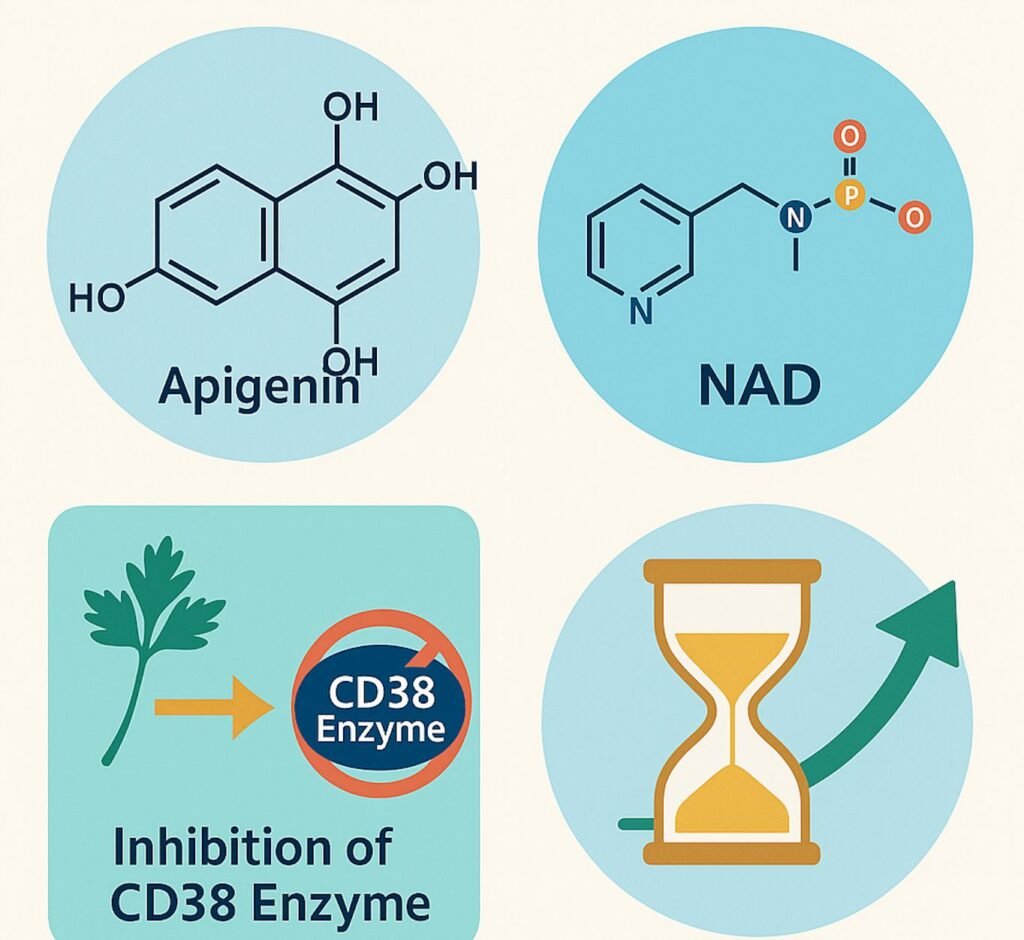1. Introduction to Apigenin and Its Health Significance
What Is Apigenin?
Apigenin is a naturally occurring flavonoid found in many fruits, vegetables, and herbs. Known for its anti-inflammatory, antioxidant, and anti-aging properties, Apigenin has gained scientific attention for its role in enhancing NAD levels, a key factor in slowing the aging process. Unlike synthetic supplements, Apigenin works gently yet effectively, supporting cellular functions that decline over time.
Brief Overview of NAD and Its Vital Role in Cellular Energy
NAD (Nicotinamide Adenine Dinucleotide) is a coenzyme found in all living cells. It’s crucial for energy production, DNA repair, and maintaining mitochondrial function. As NAD levels drop with age, cells lose their ability to function optimally, leading to fatigue, cognitive decline, and accelerated aging.
2. Understanding NAD: The Molecule of Life and Aging
The Science Behind NAD
NAD acts as a cofactor in redox reactions that fuel cellular energy. It exists in two forms — NAD+ (oxidized) and NADH (reduced) — both essential for metabolism and maintaining youth at the cellular level.
How NAD Levels Decline With Age
Research shows NAD levels can drop by up to 50% by middle age, primarily due to increased oxidative stress, DNA damage, and enzyme activity (like CD38) that consume NAD faster than it can be replenished.
The Link Between NAD Depletion and Cellular Aging
Low NAD levels impair sirtuin activity — a family of proteins that control longevity, inflammation, and DNA repair. This decline accelerates biological aging and susceptibility to chronic diseases.
3. The Biochemical Role of Apigenin in NAD Preservation
How Apigenin Inhibits CD38 Enzyme to Boost NAD Levels
One of the main mechanisms through which Apigenin boosts NAD is by inhibiting CD38, an enzyme responsible for NAD degradation. By suppressing CD38 activity, Apigenin helps preserve and elevate intracellular NAD levels, promoting better energy metabolism and cell longevity.
Interaction Between Apigenin and NAD Precursors (NMN, NR)
When taken alongside NAD precursors like NMN (Nicotinamide Mononucleotide) or NR (Nicotinamide Riboside), Apigenin acts as a synergistic enhancer. While NMN/NR increase NAD synthesis, Apigenin slows its breakdown — a powerful combination for optimal cellular rejuvenation.
Synergistic Effects: Combining Apigenin with NAD Boosting Supplements
Pairing Apigenin with Resveratrol, Quercetin, or Pterostilbene can further activate sirtuins, reduce inflammation, and extend cellular lifespan. These combinations are popular among longevity enthusiasts and biohackers.
4. Apigenin and Longevity: Mechanisms That Promote a Longer Life
Activation of Sirtuins and Longevity Pathways
Sirtuins (SIRT1–SIRT7) are key regulators of cellular aging and metabolism. Apigenin, by elevating NAD, activates sirtuins, enhancing mitochondrial health, reducing inflammation, and extending the lifespan of cells.
Anti-inflammatory and Antioxidant Benefits of Apigenin
Apigenin’s strong antioxidant properties protect cells from free radical damage, while its anti-inflammatory effects reduce chronic inflammation — both major contributors to aging.
Apigenin’s Role in DNA Repair and Cellular Protection
By maintaining NAD and sirtuin activity, Apigenin supports the body’s DNA repair mechanisms, helping prevent mutations and maintain genomic stability — vital for longevity and healthy aging.
5. Scientific Studies on Apigenin, NAD, and Aging
Key Research Findings Supporting Apigenin’s NAD Boosting Role
Recent studies have shown that Apigenin effectively inhibits CD38, the enzyme responsible for excessive NAD consumption. In a 2019 study published in Biochemical Pharmacology, researchers demonstrated that Apigenin significantly increased intracellular NAD+ levels in mice by blocking CD38 activity. This mechanism not only preserved NAD but also improved mitochondrial efficiency, supporting healthy aging.
Further, studies from the National Institute on Aging (NIA) have highlighted that flavonoids like Apigenin protect against oxidative stress and maintain redox balance — two essential factors in prolonging cellular lifespan. The growing body of evidence places Apigenin among the most promising natural NAD-preserving compounds currently known.
Animal and Human Studies on Longevity Enhancement
While human studies are still emerging, several animal studies provide compelling results. In rodent models, Apigenin supplementation was shown to:
- Enhance mitochondrial biogenesis, improving energy metabolism.
- Reduce inflammatory markers, such as TNF-alpha and IL-6.
- Extend lifespan in models of metabolic stress.
Additionally, clinical trials exploring the synergistic effects of Apigenin with NMN and NR have demonstrated better cellular NAD retention and higher sirtuin activation than NAD precursors alone. These findings suggest a strong potential for Apigenin as a longevity-enhancing supplement in humans.
Comparison With Other NAD Boosters (Resveratrol, Quercetin)
Apigenin shares some similarities with other well-known polyphenols like Resveratrol and Quercetin, but its mechanism of action is distinct:
- Resveratrol primarily activates sirtuins.
- Quercetin offers strong antioxidant benefits.
- Apigenin, however, directly inhibits NAD-degrading enzymes, making it a unique and complementary compound in NAD-boosting regimens.
When used together, these compounds can create a multi-layered longevity strategy that targets NAD preservation, sirtuin activation, and oxidative stress reduction.
6. Best Sources and Dosage of Apigenin for Optimal Results
Top Natural Sources of Apigenin (Parsley, Chamomile, Celery, etc.)
Apigenin occurs naturally in many plants, herbs, and teas. Incorporating these foods into your daily diet is an excellent way to support NAD and longevity naturally.
| Food Source | Apigenin Content (approx.) | Best Way to Consume |
| Parsley | 225 mg/100g | Fresh in salads or smoothies |
| Chamomile Tea | 5–10 mg/cup | Steep 5–7 minutes |
| Celery | 20 mg/100g | Raw snacks or juice |
| Thyme | 45 mg/100g | Dried seasoning |
| Onions | 3 mg/100g | Raw or lightly sautéed |
| Grapefruit | 1–2 mg/100g | Fresh juice |
Recommended Daily Dosage Based on Current Studies
While there’s no official RDA for Apigenin, studies suggest 25–50 mg per day provides noticeable benefits. Higher doses, up to 100 mg/day, have been used safely in longevity research and supplement formulations.
For therapeutic purposes (like NAD optimization), many supplements combine 50 mg of Apigenin with 250–500 mg of NMN or NR for synergistic results.
⚠️ Note: Always consult a healthcare professional before starting new supplements, especially if you have medical conditions or take prescription medications.
Safety, Side Effects, and Precautions
Apigenin is generally well-tolerated and has low toxicity. However, excessive intake may lead to mild gastrointestinal discomfort or drowsiness in sensitive individuals. Pregnant or breastfeeding women should exercise caution, as studies are limited in these populations.
7. How to Combine Apigenin with Lifestyle Choices for Longevity
Nutritional Synergy: Pairing Apigenin with NAD Boosters and Polyphenols
For maximum NAD preservation and cellular energy, Apigenin can be paired with:
- NMN (Nicotinamide Mononucleotide) or NR (Nicotinamide Riboside) — to boost NAD synthesis.
- Resveratrol — to activate sirtuins.
- Pterostilbene and Quercetin — for antioxidant and anti-inflammatory support.
This combination supports a trifecta of longevity benefits: higher NAD levels, stronger mitochondrial function, and enhanced DNA repair.
Importance of Sleep, Exercise, and Fasting in NAD Regulation
Lifestyle habits profoundly impact NAD levels. Research shows:
- Intermittent fasting triggers autophagy and raises NAD+.
- Regular exercise enhances mitochondrial health.
- Quality sleep supports NAD regeneration and cellular recovery.
Combining Apigenin supplementation with these habits can significantly slow biological aging and boost energy levels.
Sample Daily Routine for NAD Optimization
Here’s a simple longevity-boosting daily routine:
| Time | Activity | Purpose |
| Morning | Fasted exercise (20–30 min) | Boost NAD naturally |
| Breakfast | Smoothie with parsley and celery | Natural Apigenin intake |
| Noon | NMN/NR + Apigenin supplement | Maintain NAD balance |
| Evening | Chamomile tea | Relaxation + mild NAD support |
| Night | Sleep 7–8 hours | NAD regeneration and DNA repair |
8. FAQs on Apigenin and NAD Longevity Connection
Q1. How does Apigenin boost NAD levels?
Apigenin inhibits CD38, an enzyme that breaks down NAD. By reducing CD38 activity, Apigenin helps preserve NAD+ within cells, promoting energy and longevity.
Q2. Can I take Apigenin with NMN or NR?
Yes. Apigenin works synergistically with NAD precursors like NMN and NR, improving their efficiency and maintaining higher NAD levels for longer periods.
Q3. How long before I see results from Apigenin supplementation?
Most users report increased energy, improved focus, and better sleep quality after 4–6 weeks of consistent use.
Q4. Is Apigenin safe for long-term use?
Yes. Apigenin is a natural compound found in common foods and has shown no serious side effects even with long-term use in moderate doses.
Q5. Can Apigenin slow down visible signs of aging?
By enhancing NAD and sirtuin activity, Apigenin helps reduce oxidative stress and inflammation, which are key drivers of visible aging (wrinkles, dull skin, etc.).
Q6. What’s the best time to take Apigenin?
Taking Apigenin with food, preferably in the morning or midday, may improve absorption and minimize drowsiness for some individuals.
Summary : Apigenin as a Key Ally in the Quest for Longevity
Apigenin represents one of nature’s most powerful longevity molecules. Through its unique ability to preserve NAD levels by inhibiting CD38, it supports mitochondrial health, DNA repair, and sirtuin activation — all vital components of healthy aging. When combined with lifestyle habits like fasting, exercise, and NAD precursors (NMN/NR), Apigenin becomes a cornerstone of a comprehensive longevity strategy.
As science continues to uncover new insights into NAD biology, Apigenin stands out as a natural, safe, and effective solution to promote energy, resilience, and a longer, healthier life.

